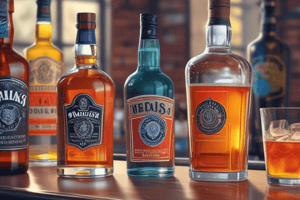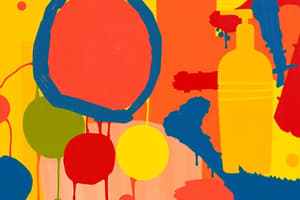Podcast
Questions and Answers
What type of liquor is made by distilling or fermenting various ingredients, such as grains, fruits, vegetables, herbs, roots, seeds, flowers, leaves, or bark?
What type of liquor is made by distilling or fermenting various ingredients, such as grains, fruits, vegetables, herbs, roots, seeds, flowers, leaves, or bark?
- Whiskey
- Neutral spirits
- Liquor (correct)
- Flavored spirits
Which government agency in the United States classifies liquor into different categories based on production methods?
Which government agency in the United States classifies liquor into different categories based on production methods?
- The Bureau of Alcohol, Tobacco, Firearms and Explosives (ATF)
- The Alcohol and Tobacco Tax and Trade Bureau (TTB) (correct)
- The Department of the Treasury
- The Food and Drug Administration (FDA)
Which type of liquor is distilled from agricultural products such as grains, fruits, vegetables, potatoes, roots, leaves, flowers, seeds, herbs, bark, or other plant materials?
Which type of liquor is distilled from agricultural products such as grains, fruits, vegetables, potatoes, roots, leaves, flowers, seeds, herbs, bark, or other plant materials?
- Whiskey
- Tequila
- Neutral spirits (correct)
- Rum
What is the main characteristic that determines the distinct types of liquors, such as whiskey, brandy, rum, vodka, gin, tequila, mezcal, absinthe, and sake?
What is the main characteristic that determines the distinct types of liquors, such as whiskey, brandy, rum, vodka, gin, tequila, mezcal, absinthe, and sake?
Which type of liquor is created by adding flavorings such as fruit juices, oils, water, sugar, spices, teas, herbs, roots, seeds, flowers, leaves, or barks to neutral spirits or wine?
Which type of liquor is created by adding flavorings such as fruit juices, oils, water, sugar, spices, teas, herbs, roots, seeds, flowers, leaves, or barks to neutral spirits or wine?
Which of the following is an example of a flavored spirit?
Which of the following is an example of a flavored spirit?
Which of the following statements accurately describes the difference between brandy and cognac?
Which of the following statements accurately describes the difference between brandy and cognac?
Which of the following statements about whiskies is accurate?
Which of the following statements about whiskies is accurate?
What is the primary characteristic of absinthe that distinguishes it from other spirits?
What is the primary characteristic of absinthe that distinguishes it from other spirits?
Which of the following statements accurately describes grape distilled spirits?
Which of the following statements accurately describes grape distilled spirits?
Which of the following statements about the history of liquor is accurate?
Which of the following statements about the history of liquor is accurate?
Which of the following statements accurately describes the production process of liquor?
Which of the following statements accurately describes the production process of liquor?
Flashcards are hidden until you start studying
Study Notes
Liquor
Liquor is an alcoholic drink made by distilling or fermenting various ingredients, such as grains, fruits, vegetables, herbs, roots, seeds, flowers, leaves, or bark. It contains ethanol, which accounts for its intoxicating effects. There are several types of liquors, including whiskey, brandy, rum, vodka, gin, tequila, mezcal, absinthe, sake, and many others. Each type has distinct characteristics determined by the raw materials used, production methods, and aging process.
Classification of Liquor
The Alcohol and Tobacco Tax and Trade Bureau (TTB) classifies liquor into the following categories based on their production methods:
Neutral Spirits
Neutral spirits are distilled from any agricultural product such as grains, fruits, vegetables, potatoes, roots, leaves, flowers, seeds, herbs, bark, or other plant materials. Examples include grain neutral spirits that can be used to make products like vodka, gin, rum, tequila, and cognac. Fruit brandies such as applejack, cherry brandy, elderberry liquor, and peach brandy also fall into this category.
Flavored Spirits
Flavored spirits are created by adding flavorings such as fruit juices, oils, water, sugar, spices, teas, herbs, roots, seeds, flowers, leaves, or barks to neutral spirits or wine. Some examples of flavored spirits include liqueurs, cordials, amaretto, schnapps, sloe gin, herbal liqueurs, and various other specialty products.
Brandy and Cognac
Brandy and cognac are aged spirits made from fermented and distilled fruit juice. Vintage brandy is always aged for more than two years, while vintage cognac must be aged for at least four years.
Whiskies and Bourbon
Whiskies are made primarily from cereals such as corn, wheat, barley, and rye. Bourbon whiskies are made with at least 51% corn.
Absinthe
Absinthe is a highly alcoholic spirit made from wormwood and other botanicals. It is usually colorless but may have slightly greenish tinge due to the presence of chlorophyll in the herbs used during distillation.
Grape Distilled Spirits
These spirits are made from grapes either through distillation after fermentation or direct distillation if the sugar content is high enough. Examples include grappa, marc, and pomace brandy.
Miscellaneous Products
This category includes miscellaneous products such as aquavit, ouzo, and soju.
History of Liquor
The history of liquor dates back to ancient civilizations, with evidence of distilled spirits being found in ancient Egypt and China. The first recorded distillation occurred in the 12th century in Europe, where monks discovered that distilling wine created a clear spirit that was more potent than the original wine. This discovery led to the creation of various types of liquor, each with its own unique characteristics and production methods.
Production of Liquor
The production of liquor involves several steps, including fermentation, distillation, and aging (for some types of liquor). The choice of raw materials, fermentation process, and distillation methods can significantly affect the taste, aroma, and overall quality of the final product.
Fermentation
Fermentation is the process by which yeast converts sugars into alcohol and carbon dioxide. This process is essential for creating alcoholic beverages, including liquor. The type of yeast used, the temperature, and the length of fermentation can all influence the final product's flavor and aroma.
Distillation
Distillation separates the alcohol from the rest of the liquid, creating a concentrated spirit. Different distillation methods, such as pot still distillation and column still distillation, can produce varying results.
Aging
Some types of liquor, such as whiskies and brandies, are aged in oak barrels to add complexity and depth to the flavor. The length of aging and the type of barrel can significantly impact the final product's taste and aroma.
Health Effects of Liquor
Alcohol consumption can have both positive and negative effects on health. Moderate alcohol consumption, defined as up to one drink per day for women and up to two drinks per day for men, may have some health benefits, such as reducing the risk of heart disease and stroke. However, excessive alcohol consumption can lead to a range of health problems, including liver disease, heart disease, stroke, certain cancers, and mental health issues.
Environmental Impact of Liquor
The production of liquor can have a significant environmental impact, particularly in terms of water usage and greenhouse gas emissions. For example, the production of one liter of whisky requires about 1,500 liters of water. Additionally, the use of pesticides and fertilizers in the cultivation of crops for liquor production can harm soil quality and contribute to water pollution.
Regulation of Liquor
Liquor production and distribution are heavily regulated by various government agencies, such as the Alcohol and Tobacco Tax and Trade Bureau (TTB) in the United States and the European Union's Alcohol and Tobacco Taxes Directive. These regulations aim to ensure the quality, safety, and labeling of liquor products, as well as to control their production, distribution, and sale.
In conclusion, liquor is a diverse and complex category of alcoholic beverages with a rich history and a wide range of production methods. While moderate consumption may have some health benefits, excessive alcohol consumption can lead to a variety of health and environmental issues. Regulation plays a crucial role in ensuring the quality and safety of liquor products, as well as controlling their production, distribution, and sale.
Studying That Suits You
Use AI to generate personalized quizzes and flashcards to suit your learning preferences.






